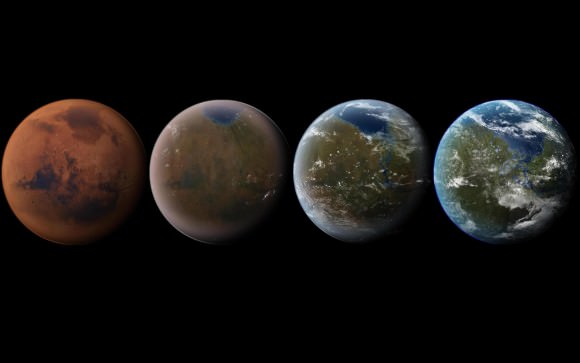|
Mars scientists should heed the Falcon Heavy demo as a wakeup call that the days of their exclusive access to Mars is coming to an end.
I think most of us reacted with some combination of awe, amusement, and chagrin that SpaceX’s inaugural Falcon Heavy payload would be Elon’s midnight cherry red Tesla Roadster playing David Bowie’s “Space Oddity” on a Mars Transfer Orbit. It is going to be a very special launch, whatever happens. But some space enthusiasts and Mars lovers that reacted differently to the announcement. Opportunities for sending stuff to Mars are pretty rare, and the exceptional mass transfer capability of the Falcon Heavy would be a wonderful opportunity to do things in Mars exploration that have not been done before. Instead of sending a car, we could be sending something that will help us better understand the planet Mars, and teach us new things about the solar system. There are also potential hazards from this launch. Sending a vehicle that has been used and driven around all over the earth also means that it is going to be covered in small, biological organisms all over, underneath the seats and the nooks and crannies. Not to mention a lot of Elon’s dead skin and hair cells, providing food for all sorts of critters. If the upper stage has a malfunction and manages to accidentally hit Mars, some of that biological residue or even viable lifeforms / spores would certainly survive.
The reaction among more scientifically oriented space fans and the planetary science community seemed to be one of disappointment, or even a little anger. Maybe I am over-interpreting a sarcastic twitter account, but I know there are many who sincerely feel this way.
Ignoring the actual risks associated with putting a payload on this mission and getting usable data out of it, I wrote this post specifically to discuss this attitude that I see from many in the planetary science community. They have been doing space science for so long and are so focused that they seem to think the penultimate goal of spaceflight exclusively to do science in space. However, they are not the only valid stakeholders who wish to do things in space and on other planets! Many people, currently building rockets and space capsules, are ready to settle, colonize, or otherwise develop space resources and planets. There is a clash in ideologies between these two groups that has been dormant since the end of the apollo program, but will surface once again. And as has happened before, those arguing for the conservation of objects in space will lose more than they win.
In the 1950’s, it was believed that the moon might have a tenuous atmosphere. It was determined by a group of scientists that until this atmosphere could be properly studied, no nation should fire a rocket thruster anywhere in the vicinity of the moon. But as we all know, this was promptly ignored as soon as the technology matured to the point where it could happen. There were some scientists who had concerns about contaminating the moon with chemical or biological material, but those concerns were brushed aside because of the importance of the space race. Since then, Human spaceflight and planetary science have been at peace because the planets have been ignored. There has never been a national imperative to put people on the moon or dig through the icecap of Europa. The rest of the solar system has been the exclusive domain of science because it has been ignored by everyone else. The solar system has been the exclusive domain of scientific NASA payloads for generations, and some might have convinced themselves it will stay that way forever. But that exclusive use will come to an end in the next decade. A cherry-red Tesla rising in the Martian sky at 10,000 mph is certainly a way to break the quiet. The Planetary Science community needs to come to terms with the coming horde. The tide of commercial and non-scientific payloads coming to Mars will become more and more of a threat to science year after year. When concerns are raised about damaging the pristine environment, they will not have the political capital to preserve Mars in all they ways they want to, and once the technology and willpower is there, their concerns will be brushed aside.
To Planetary Scientists:
The Solar System is not your private laboratory. You cannot control and regulate what other people will do once they leave earth, and you certainly can’t stop anyone from living on Mars. The time of exclusive use for science is coming to an end, and the clock is ticking to perform astrobiological science on Mars before the biosphere is changed forever.
0 Comments
Leave a Reply. |
Lars OsborneBS Mechanical Eng Categories
All
|



 RSS Feed
RSS Feed
